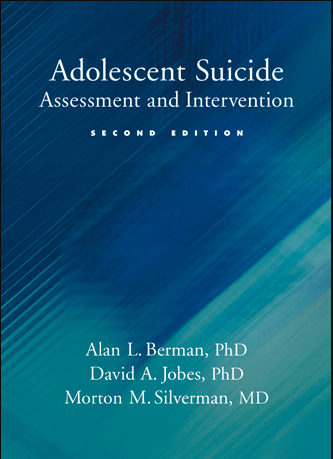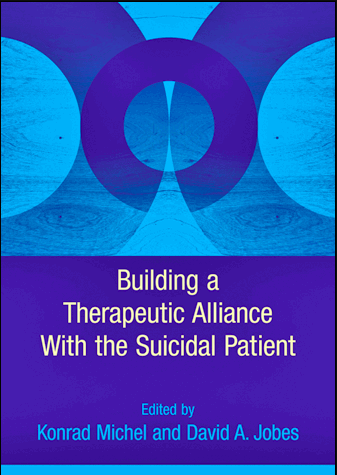Suicide Prevention Books
Resources for ReadingS In Suicidology
There are various books on clinical suicidology that describe Dr. Jobes’ approach to assessing and treating suicidal risk with both adult and adolescent suicidal patients. The following books may be purchased through the publishers as listed below.

The Collaborative Assessment and Management of Suicidality (CAMS) approach has garnered a strong evidence base and has been implemented by thousands of therapists from a range of orientations in diverse clinical settings. This extensively revised manual provides a proven therapeutic framework for evaluating suicidal risk and developing and implementing a suicide-specific treatment plan that is respectful, empathic, and empowering. In addition to their clinical utility, the procedures used for assessment, treatment, and progress monitoring within CAMS can help reduce the risk of malpractice liability. In a large-size format for easy photocopying, the book includes all needed reproducible tools for implementing CAMS, including the Suicide Status Form-4. Purchasers also get access to a Web page where they can download and print the reproducible materials. This book can be purchased through Guilford Press Publishing at a 20% discount.

For the past decade, Adolescent Suicide: Assessment and Intervention has been recognized as the best and most authoritative text on this most tragic of subjects. This long-awaited second edition incorporates almost 15 years of new research and critical thinking about clinical assessment and intervention in addition to an expanded focus on prevention. Authored by three of the world’s leading experts on suicide, including among them a psychiatrist, this book is a must-have reference and text for those working with this at-risk population.This volume reflects on what is current and promising in working with the suicidal adolescent and provides information relevant to theory, research, practice, and intervention. It provides empirically based findings that can be easily integrated and translated for practical use by the clinician. In addition, the book includes discussion of malpractice risk management, over 40 case illustrations, and an extensive list of references—all of which help provide a thorough understanding of the at-risk-for-suicide patient. This book can be purchased through American Psychological Association.

The quality of the therapeutic alliance is a well-established factor for successful therapy process and outcome. When it comes to treating suicidal patients, a strong therapeutic alliance can quite literally save a person’s life. In this book, editors Konrad Michel and David A. Jobes have enlisted an elite group of clinicians and researchers to explore what has become known as the “Aeschi approach” to clinical suicide prevention.According to this view, mental health professionals working with patients at risk for suicide must recognize a fundamental conflict at the heart of good clinical practice: while they are experts in the assessment of disorders of mental health, when it comes to the patient’s story, the patient is the expert. Any successful intervention with a suicidal patient must therefore be based on an empathic understanding of suicidal thoughts and behavior that honors the patient’s very personal perspective. This book can be purchased through American Psychological Association.